Why did I Injured my Rotator Cuff?
There can be many reasons behind a rotator cuff injury. Now, activities that involve throwing, swimming and pitching are regular weekend activities for many. These activities, which are relegated to the weekends, are often performed with poor technique, muscle fatigue, inadequate conditioning, and inadequate warm-ups. Some of these weekend warriors may as well spend some time strengthening their chest muscles, bicep muscles, triceps muscles and the deltoid muscles but overlook the smaller rotator cuff muscles. If any of the rotator cuff muscles fails to dynamically stabilize the humeral head in the glenoid cavity, rotator cuff problems such as tendinitis will arise.
The rotator cuff system, also known by their acronym SITS (S= supraspinatus, I= infraspinatus, T= teres minor, S= subscapularis | See the graph above), is a group of muscles whose primal mission is to maintain the humeral head in its proper location within the glenoid cavity. The supraspinatus is the most often-injured rotator cuff muscle. Injury often occurs from repetitious overhead movements. The infraspinatus, which is the most powerful of the three external rotators, is vital to maintaining the posterior stability of the glenohumeral joint. It is also the second most commonly injured rotator cuff muscle. The teres minor works alongside with the infraspinatus. The subscapularis acts with the latissimus dorsi and teres major muscles in extension of the glenohumeral joint, but due to its proximity to the joint is less powerful. These muscles, which are not very large in comparison to the pectoralis major, deltoids, and latissimus dorsi, must possess adequate strength and muscular endurance to ensure their proper functioning or it is most likely that repetitive overhead movements will eventually lead to acute or chronic problems.
Also, accidents can happen and even with proper care/training you may actually injure your rotator cuff. Once, I failed to rack my weights on the chest barbell and bend my left shoulder beyond its ROM injuring my rotator cuff. Three or less seconds were enough to injure myself for a little less than a year. If you injure your rotator cuff, no matter the reason, first step is always to consult your orthopedic doctor to evaluate the damage. Be patient and learn the proper exercise regime to recover yourself and always learn more about the activities you do and how the mechanics/anatomy of your body relate to them so you can get the best outcome and enjoy them.
Don’t forget we are always here to help you. So if you have any questions just contact us.
Orthopedic Corner | Leon Mead MD Orthopedic Doctor | 730 Goodlette Road North, Suite 201 Naples Florida 34102 | Phone: (239) 262-1119


